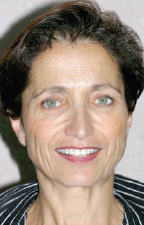 Dr. Marielle Pariseau
Dr. Marielle Pariseau
When I started planning my 35-year class reunion, my thoughts drifted back to my time in dental school, with its attendant hopes, ambitions and worries. In the seventies, researchers were working on a vaccine to prevent tooth decay, and I was concerned there wouldn't be enough work for a lifetime career in dentistry. I reassured myself that I would find ways to adapt and started practising with dreams of making a difference. I look back now and feel I did make a difference, but a very small one, and perhaps only within the sphere of my own private practice.
In the larger scheme of things, the changes I was expecting to see in the course of my dental career simply have not happened. Tooth decay is still the most prevalent childhood disease, 5 times more prevalent than asthma. By the end of their teen years, more than two-thirds of our children show evidence of tooth decay. These statistics are embarrassing given that tooth decay is a preventable disease. To make matters worse, erosion is becoming an even bigger threat than decay. Early in my career I seldom saw erosion. Today, I treat this problem regularly.
Statistics on obesity are just as depressing. One-third of Canadian children are either overweight or obese. Of these children, 70% will grow up to become obese adults who may suffer from some of the health consequences of obesity, such as diabetes and hypertension. It isn't very farfetched to associate obesity with erosion when we know that some researchers attribute obesity in large part to pop consumption.
During my career I have kept up with all the new dental techniques and procedures. But has my focus on new technology distracted me from the very things I should have been paying attention to? I prided myself in practising leadingedge dentistry while spending my days repairing the consequences of a preventable disease. An ethical dilemma, to be sure.
In the past 3 decades we have not made much progress in reducing the incidence of tooth decay. And we don't seem to be able to prevent erosion either. Why is it that we are seeing so little fundamental change? My gut feeling is that, if we were to compare monies invested in treatment versus prevention, treatment modalities would probably have received the bulk of the investments. We know that teeth have a limited ability to heal. Should we not, therefore, focus our efforts on prevention and education?
Admittedly, the allure of technology has been hard to resist. We've come a long way since G.V. Black. Dentistry has become a hugely appealing profession with its fusion of art and science. Today we can transform people by fixing their teeth! But if we are truly ethical, shouldn't our focus shift from helping people keep their teeth for a lifetime to helping people keep their teeth decay-free for a lifetime? A small shift in semantics that has huge implications. A shift from being reactive to proactive. A shift toward more education, toward extending the reach of meaningful oral knowledge from the circle of dentistry to other circles of influence.
We dentists have the highest levels of oral health literacy in the world. Have we not focused our efforts on providing our patients with the best care possible? Have we not been pioneers among health professionals when it came to introducing education within the realm of our day-to-day practices? Have we not, as a result of these efforts, greatly improved our profession's profile? Yes we have. What we need now is a shift from a problem-solving approach to one focused on possibility—the possibility of creating a decay-free future.
Thirty-five years have gone by since I graduated from dental school, and my profession isn't quite where I expected it would be after all these years. Do you, like me, experience a vague feeling of dissonance between expectations and reality? Perhaps now is a good time to look at the broader picture and decide what kind of impact dentists can have on global health. The time has come for our leadership to explore new possibilities if we are to build a legacy of prevention for the future.
